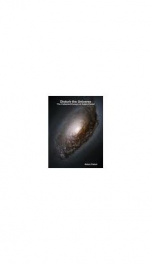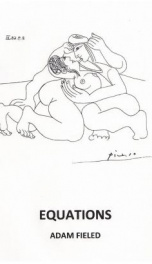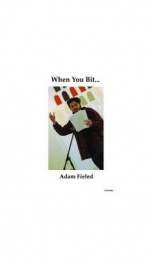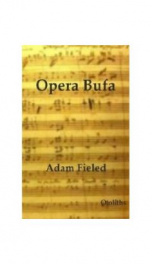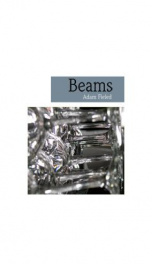Steve Halle on “Posit”: Fluid/Exchange (2007)
Adam Fieled's Posit: with an I to an I for an I
Postulation of one's own existence via tempest-in-a-teapot verse will not cut it anymore, and despite Mr. Fieled's recent posts about a new and exciting confessionalism, he wants to shake contemporary mainstream poetics to its core in his new Dusie chap Posit.
In Lewis MacAdams's book Birth of the Cool, MacAdams describes Paris's post WWII existentialist crowd, led by Sartre, as calling themselves "les rats," but what happens to existence and the self-as-meaning-maker when something bigger comes along? This is precisely the question taken on by Fieled in his poem "Le Chat Noir" (The Black Cat). The poem's layers allow for varied interpretations from the confessional: I smoke some pot and wander into an alley in freezing cold weather and a black cat crosses my path, oh shit; to the philosophical: I'm feeling something, I'm cold and high and surrounded by darkness (Creeley's "I Know a Man" anyone?) This feels real, but then superstition intrudes in the form of the black cat. In an existentialist reading, if they are "the rats," as the "I" of this poem seems to be, then what to do when the black cat comes along? After all, cats kill rats, right? We can make no meaning of making this meaning except to say "look a cat / a black cat le chat noir oh no" and perhaps run away, O'Hara like, from this clear and present danger. Or we can return to a quasi-literal reading of stoned speaker dreaming the 19th century Parisian bohemian cabaret Le Chat Noir appearing in a Philadelphian hallucination...
While I think "Le Chat Noir" the cleverest, and haply most ambiguous, poem in Posit, the title poem's not bad either, giving us the straightforward location of this chap in dealing with the first person:
I want
but that's
nothing new.
I posit
no boundary
between us.
Of course, the poem looks the part, shaped as it is like a giant "I," and asserting the way in which contemporary mainstream poetry attempts to connect with readers, "I say you, / I know you, / I think so," covering the I-you relationship of Rimbaud's "I is another" while leaving room for the fashionable, if nowadays heavy-handed, indeterminacy in poetry. In a closed circuit such as the I-you, the third person never gets asserted, and a real arrogance exists in believing one knows another rather than having the wisdom to call the other, other. This brand of poetry "could / go on / forever," politically and correctly asserting the I knows everything, everywhere, everyone.
But then the cats and eyes/Is also emerge in the fine poem "Eyeballs," a poem playing with the story of Oedipus, who married his mother, Jocasta, and tore out his eyes upon discovering so. Jocasta commits suicide and therein we lay our scene of eyeballs beneath dangling feet. Jocasta's "stout / ex-maenad" maid comes upon the scene, and instead of being horrified, she pockets the eyeballs in a moment of Dionysian/Maenadian-mystery, as the lurid things resemble grapes. Then, oh no, the eyeballs become even more lurid, playthings for her cats, (perhaps they are black, the poem doesn't say). How absurd! It's easy to make some existential meaning out of that: cats don't kill rats, they play with eyeballs...I-balls. As Fieled indicates in loosely veiled lines, poet and speaker in unison, at the end of the poem, "Perhaps there is / use for everything." (the eyes, the I, this myth) "and if I am a thief, / who will accuse me?" More than a little intimation of Thomas Stearns Eliot (or T-Sizzle, as I call him) in that line, eh?
While Fieled crams a great deal of thought into a small-chap space, some of the poems disintegrate into sexual innuendo, which does not scratch my readerly itches, as it were. For example, "10:15 Saturday Night" begins with such promise, using speech-inspired, pick-up line type verse:
then like how bout we give this
thing a chance or at least not bury it
beneath a dense layer of this could
be anyone, we could be anyone,
anyone could be doing this, just
another routine, another way of
saying hello, & goodbye just
and here's where he loses me:
around the corner like a dull
dawn layered thick in creamy
clouds, ejaculations spent
The poem loses me at the end because I think I was getting to the sex anyway, more subtly from the pickup language, which gets mighty heady in transposing sex-as-physical-act for the sex-as-end-all-be-all-moment, so that I didn't need the hammer of ejaculations spent on me (pun intended, I guess). Or maybe I'm wrong, and this is why I write in the first place to use my (jungle cat-like) poet's rhetorical nimbleness to turn rock-head, jock-head pick up lines into "creamy clouds" of post-coital detritus.
All in all, Fieled's Posit is a solid read. It's lurid and surrealy entertaining enough to bring me through once and packed with enough thought-meat to keep me chewing, thinking and returning, which is ultimately what we all want from poetry.

